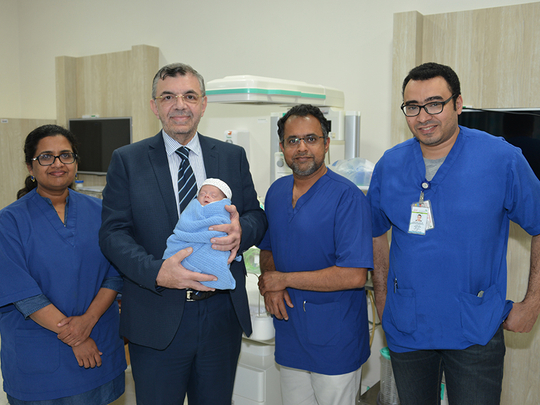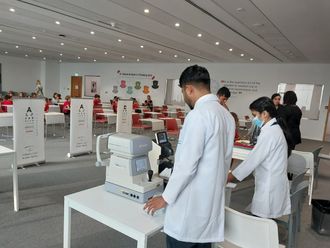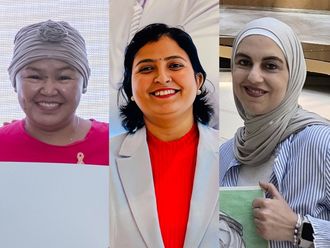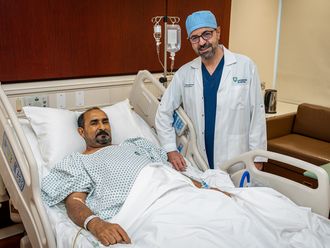
Latifa Hospital doctors saved the life of a baby born prematurely at 24 weeks in October after his mother developed a life-threatening condition.
With the intensive care and high-quality services provided by the hospital, the baby, who weighed 445 grams at birth, was discharged last week weighing 1.9 kilograms.
Perils of pre-eclampsia
Dr Khaled El-Atawi, Consultant Neonatologist at Latifa Hospital, says the baby was born prematurely after his Palestinian mother got pre-eclampsia and so needed to be operated on immediately to save her life and her baby’s life. The baby’s twin, who was born with a weight of 385 grams, unfortunately did not survive.
Dr El-Atawi says pre-eclampsia is a pregnancy complication characterised by high blood pressure and signs of damage to another organ system, most often the liver and kidneys. Pre-eclampsia usually begins after 20 weeks of pregnancy in women whose blood pressure had been normal. Left untreated, pre-eclampsia can lead to serious — even fatal — complications for both the mother and the baby. If you have pre-eclampsia, the only cure is delivery of the baby.
Dr El-Atawi says that after the baby was born, he was immediately treated at the hospital’s neonatal ICU (NICU) — which is considered largest in the northern emirates with 64 beds — where the baby received intensive medical attention.
Dr El-Atawi explains that the Golden Hour approach was implemented immediately after birth. This includes a quick and efficient admission process of babies with extremely low birth weight and the stabilisation of the baby during the first hour with quick resuscitation. The Golden Hour approach also includes the avoidance of hypothermia and acquisition of IV access for nutrition.
He adds that fluid administration was also completed through a multidisciplinary tiny baby workgroup. This includes neonatal resuscitation, post-resuscitation care, transportation of sick newborn to a NICU, respiratory and cardiovascular support and initial course in nursery. This may help improve neonatal outcomes, avoiding intraventricular haemorrhage, chronic lung disease and retinopathy of prematurity.
After five months of intensive care by experienced neonatal specialists using the latest state-of-the-art technology, the baby was discharged last week in good condition weighing 1.9kg on room air.
Weight norms
Dr El-Atawi explains that preterm babies are those born before 37 weeks, normally weigh less than 2.5kg, and in need of essential care to be nursed back to health, including protection from infections, ensuring that they are kept warm, ensuring skin-to-skin contact with the mother and that they are receiving sufficient breast milk.
Dr Mahmoud ElHalik, Head of Paediatrics and Neonatology at Latifa Hospital, said the hospital ensures provision of essential care at its facility. Almost 25 per cent of the 980 babies admitted to NICU in 2017 were preterm.
“DHA hospitals encourage family involvement to promote a baby’s healthy development in the NICU from day one. Neonates are placed in an incubator and once the baby’s condition is stable, healthcare professionals teach the mother and father kangaroo care (which is skin-to-skin contact between the baby and their parents). Parents’ reassuring and loving touch is known to have many health benefits and one of the key benefits is that it helps in the lactation process. Babies’ vital signs are closely monitored, a feeding tube may be used to provide breast milk to preterm babies and when the baby can suckle, direct breast-feeding is introduced.”
Latifa Hospital has nursed babies as tiny as 420 grams back to health and has achieved more than 85 per cent exclusive breastfeeding rate for all the neonates admitted in the NICU.
“We provide total body cooling — for babies who experienced hypoxic ischemic encephalopathy at birth — where the infant’s temperature is lowered slowly and safely to 33 degrees centigrade for three days,” says Dr ElHalik. “This technique has internationally proven to decrease the severity and extent of potential brain injury from HIE.”
Post-delivery care
Latifa Hospital is also a Pioneer in Dubai to provide a family room in the NICU, where the neonate and the mother stay for a few days prior to discharge from hospital.
“This is a one-of-a-kind of facility available at Latifa Hospital. During these days, the mother spends 24 hours with her baby (especially complicated cases) and practices the bathing, feeding and routine care for her newborn. We also educate her on signs and symptoms to look out for, which require her to bring her baby back to the hospital. She is enhanced on the initially taught breastfeeding techniques, provided with details of the next follow-up visits and a vaccination schedule,” says Dr ElHalik.












